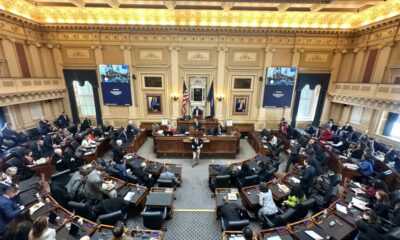News from the South - Kentucky News Feed
House bill would hurt efforts to remediate lead hazards in Louisville
House bill would hurt efforts to remediate lead hazards in Louisville
by Tom FitzGerald, Kentucky Lantern
February 26, 2025
In Metro Louisville, after extensive input from the public, including landlords and health officials, Metro Council adopted an ordinance in 2022 that took effect in December 2024, requiring residential rental properties be screened for lead hazard and that identified hazards be corrected. The ordinance creates a registry of residential rental properties and their compliance status. Based on the age of the residential unit, a lead hazard screening and control would be required in one, two, or three years.
Lead poisoning is one of the most pernicious and avoidable of child health hazards. Yet opponents of the Louisville ordinance requiring residential rental properties be screened for lead hazard and the hazards corrected before leasing them, have found an apparently sympathetic ear in the sponsors of House Bill 173, a bill that would preempt any local government from maintaining a registry of residential rental properties for any purpose, including lead hazard assessment and correction.
The intent of HB 173 seems clear – local government should not be allowed to require a landlord holding out rental property for human habitation, to assess and correct lead hazards, and to list the property and its compliance status on a registry.
Although banned for residential use in 1978, EPA estimates that some 31 million pre-1978 houses still contain lead-based paint, and 3.8 million of them have one or more children under the age of 6 living in them. Lead-contaminated dust is one of the most common causes of elevated blood lead levels in kids and commonly occurs when lead-based paint deteriorates or is disturbed. Due to normal behaviors such as crawling and hand-to-mouth activities, young children are particularly at risk of higher exposure to ingesting lead-containing dust. Lead exposure can pose a significant health and safety threat to children and can cause irreversible and life-long health effects, including behavioral problems, lower IQ, slowed growth and more. There is no safe level of exposure to lead, and no beneficial, therapeutic, or non-consequential level of lead in a child, the U.S. Environmental Protection Agency notes. And the effects of lead poisoning on children are irreversible. Once measurable blood lead levels are detected, the injury has already occurred.
Lead was banned in paint in 1978, yet 47 years later, we are still grappling with the legacy of the harm to children from its past use in residential housing. In Metro Louisville alone, it is reported that 10,000 children tested positive for elevated blood lead levels from 2005-2021.
Every single day that passes where a rental property contains a lead hazard that has not been detected and corrected (both of which can be accomplished at reasonable cost in most cases), we are risking further exposure of children, including infants, to the easily preventable yet irreversible health hazards of lead poisoning.
No one holding out pre-1978 properties for residential rental should be allowed to ignore the potential risk of lead-based paint hazards. No child should be exposed to the risk of a life of diminished health and opportunity from lead hazards. The Kentucky House of Representatives appears poised to move forward a bill to preempt the local registry unless the ordinance is weakened this week. The threat of preemption appears to be working, since on Thursday evening Metro Council will consider an ordinance to eliminate the requirement that owners proactively test and remedy lead hazards in all residential rental units. For fear of preemption, some in Metro Council appear ready to acquiesce, using the anemic argument that “something is better than nothing.” Assessment and correction of lead hazards in pre-1978 private residential rental units would be required under the revised ordinance only after a code enforcement inspection detects potential lead hazard.
Let us be clear here. “Something,” in this case, is not a responsible compromise. Agreeing to allow more lead poisoning of kids by letting residential landlords off the hook for testing and correcting lead hazards in all pre-1978 rental units in a timely manner; and instead requiring assessment and correction only after a complaint or where a test shows that child to have been damaged by lead poisoning, is indefensible. It is not a compromise. It is a capitulation under duress to which neither the General Assembly nor the Metro Council should be party. Kentucky’s kids deserve better.
The majority in our state legislature claim to favor local control. After working with local governments for 45 years, on hazardous waste, air quality, solid waste management, planning and zoning, and other issues affecting public health and quality of life, I believe that local officials are closest to the community, and are usually best suited to craft strategies to improve and protect public health and quality of life. During my 45 years as a lobbyist, I testified before numerous legislative committees, and helped to author reforms in solid and hazardous waste, mining regulation, and utility regulation. During that time, the importance of local authority in matters of public health and quality of life, was usually respected.
Yet the General Assembly has in recent years all too often become the focus of special interests who, because they haven’t gotten their way on a local issue, seek to embroil the General Assembly in overriding or preempting local control as a tool to gain what could not be won locally in arguments on the merits.
After countless hours of effort, involving a broad range of interests, Louisville’s government adopted a reasoned and balanced ordinance to address the tragic legacy of lead-based paint poisoning in our community’s private rental housing, and to give effect to what basic humanity and justice demands – you shouldn’t take money for renting living space without identifying and remedying hazards, and you shouldn’t either knowingly or as a matter of convenient ignorance, expose children to lead hazards and a lifetime of negative health outcomes.
If there is a concern regarding cost, an ordinance could impose reasonable upper bound limits on remediation and require notice to tenants of any risks remaining. If the concern is one of “private property rights,” then don’t hold your private property out as fit for public habitation for compensation, without first determining it to be safe.
If successful in using the threat of state preemption as a tool to weaken public protection in this case, there will be no end to future efforts by special interests to preempt reasonable local government efforts to protect public health. If a local government acts arbitrarily in a matter of public health regulation, the courts are always open to review that claim. But where a local community, after extensive input from all parties, crafts an ordinance to require reasonable actions in pre-1978 rental housing to detect and correct avoidable lead health hazard to kids, the General Assembly should respect that judgment, and make clear that it will not be party to any effort to undercut local government efforts to protect the health of kids, including from lead hazards in rental property.
Kentucky Lantern is part of States Newsroom, a nonprofit news network supported by grants and a coalition of donors as a 501c(3) public charity. Kentucky Lantern maintains editorial independence. Contact Editor Jamie Lucke for questions: info@kentuckylantern.com.
The post House bill would hurt efforts to remediate lead hazards in Louisville appeared first on kentuckylantern.com
News from the South - Kentucky News Feed
A few storms and warm early august temperatures persist
SUMMARY: Central and Eastern Kentucky experienced pleasant early August weather with scattered clouds keeping highs in the low to mid-80s, cooler than usual. Tuesday saw isolated afternoon storms, causing localized heavy rain and minor flooding in areas like Lexington. Wednesday repeats this pattern with mild temperatures, scattered storms, and a mix of clouds and sun. Late in the week, warming occurs as an upper-level ridge builds, raising temperatures to the upper 80s with decreased storm chances. The weekend promises mostly dry, warm weather with highs near the upper 80s, though scattered rain may appear late Sunday due to a low-pressure system and a cold front.
The post A few storms and warm early august temperatures persist appeared first on www.wtvq.com
News from the South - Kentucky News Feed
Police arrest suspect in killings of 4 Tennessee family members
SUMMARY: Austin Robert Drummond, 28, was arrested in connection with the murders of an infant’s parents, grandmother, and uncle in western Tennessee. The infant was found abandoned in a front yard in Tigrett, about 40 miles from where the victims were discovered in nearby woods. Drummond, believed to have targeted the family, faces four counts of first-degree murder, aggravated kidnapping, and weapons charges. Authorities say the victims—James M. Wilson, Adrianna Williams, Cortney Rose, and Braydon Williams—were relatives of the infant, who is now safe with other family members. Two others have been charged with assisting Drummond.
The post Police arrest suspect in killings of 4 Tennessee family members appeared first on www.wnky.com
News from the South - Kentucky News Feed
Former police officer involved in Breonna Taylor raid appeals sentence
by Sarah Ladd, Kentucky Lantern
August 5, 2025
Former Louisville police officer Brett Hankison has appealed the nearly three-year sentence he received for his role in the 2020 police raid that killed Breonna Taylor, an unarmed Black woman.
The notice of appeal, filed Tuesday, comes after U.S. District Court Judge Rebecca Grady Jennings last month sentenced Hankison to 33 months in prison for violating Taylor’s civil rights during the raid.
Former police officer involved in Breonna Taylor raid gets 33 months sentence
Hankison “appeals both the conviction and the sentence imposed in this case,” the notice says. He was sentenced to 33 months in prison and three years of supervised release in July.
In handing down that sentence, Jennings, who was appointed by President Donald Trump, rejected the U.S. Department of Justice’s recommendation that Hankison be sentenced to a single day of time served.
On the night Hankison and others came to Taylor’s apartment in March 2020 with a “no-knock” search warrant, police were investigating a former boyfriend of Taylor’s who lived at a different address. Taylor and her boyfriend, Kenneth Walker, were in bed when police broke into the apartment. Walker fired at what he thought were intruders breaking into the residence, striking Sgt. Jonathan Mattingly in his thigh. Mattingly initially sued Walker but dropped the case voluntarily in 2023.
Hankison and two other officers fired their guns a total of 32 times. Hankison fired from outside the apartment through a covered sliding glass door and window, hitting a neighbor’s apartment. It was later determined that officer Myles Cosgrove fired the shot that killed Taylor, whose death led to massive protests in Louisville and beyond. He was not charged and was later hired by a police force in Carroll County.
https:ecf.kywd.uscourts.gov:cgi-bin:show_temp.pl?file=4868762-0–88181.pdf&type=application:pdf
GET THE MORNING HEADLINES.
Kentucky Lantern is part of States Newsroom, a nonprofit news network supported by grants and a coalition of donors as a 501c(3) public charity. Kentucky Lantern maintains editorial independence. Contact Editor Jamie Lucke for questions: info@kentuckylantern.com.
The post Former police officer involved in Breonna Taylor raid appeals sentence appeared first on kentuckylantern.com
Note: The following A.I. based commentary is not part of the original article, reproduced above, but is offered in the hopes that it will promote greater media literacy and critical thinking, by making any potential bias more visible to the reader –Staff Editor.
Political Bias Rating: Center-Left
This content presents a detailed and factual account of the legal case involving former officer Brett Hankison and the Breonna Taylor incident. It highlights civil rights violations, the sentencing, and the surrounding controversy, including the community protests and the DOJ’s differing sentencing recommendation. The tone is predominantly factual but includes elements that emphasize accountability for police misconduct and systemic issues in law enforcement, which tends to align with a center-left perspective emphasizing social justice and reform within the justice system.
-
News from the South - Texas News Feed5 days ago
Rural Texas uses THC for health and economy
-
News from the South - Texas News Feed7 days ago
Yelp names ‘Top 100 Sandwich Shops’ in the US, several Texas locations make the cut
-
Mississippi Today2 days ago
After 30 years in prison, Mississippi woman dies from cancer she says was preventable
-
News from the South - Kentucky News Feed7 days ago
Harrison County Doctor Sentenced for Unlawful Distribution of Controlled Substances
-
News from the South - Texas News Feed7 days ago
Released messages show Kerrville officials’ flood response
-
News from the South - Louisiana News Feed7 days ago
Residents along Vermilion River want cops to help prevent land loss
-
News from the South - Louisiana News Feed6 days ago
‘Half-baked’ USDA relocation irritates members of both parties on Senate Ag panel
-
News from the South - Florida News Feed7 days ago
Officer shot, hospitalized after shooting near Busch Gardens








































